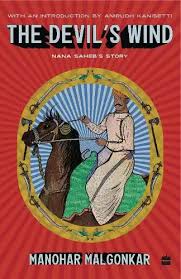Devil's wind
Manohar Malgonkar (1913-2010) was an eminent post-Independence writer whom R.K. Narayan once referred to as his ‘favourite Indian novelist in English'. Born near Belgaum, Malgonkar was the grandson of the prime minister of a former princely state of Dewas. He served in the army during World War II, was a big-game hunter, a farmer, a mine owner and an adventurer. Later, he started working as a journalist and thereafter took to book writing. His works are as diverse as his personal life and have a blend of history, romance and military life. Many of his works have been translated into several European languages. In an article published in The New York Times in 1965, he was hailed as ‘one of India's most exuberant storytellers'. ... Read more Read less
When Dhondu Pant Nana Saheb, the adopted son of exiled Maratha Peshwa Bajirao II, is denied rights as the Peshwa's heir by the British after his father's death, he makes an appeal to reclaim his title, only to be rebuffed again. Then, as a mutiny breaks out in Kanpur in 1857 and Nana Saheb emerges as its leader, he is labelled by the British as a villainous monster, a barbarous butcher and the criminal leader of the 'Sepoy Mutiny', which sweeps across India from 1856 to 1859. Yet, to a nation in turmoil, he becomes a hero who stands up to the colonial oppression and emerges as a forerunner to the leaders who bring freedom to the nation less than a century later. In The Devil's Wind, Nana Saheb's story-a significant, turbulent and intrigue-filled chapter in India's history-is skilfully brought to life by master storyteller Manohar Malgonkar in vivid, inventive detail.











